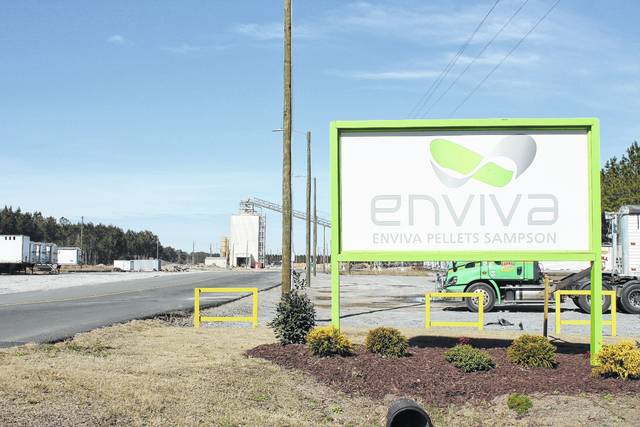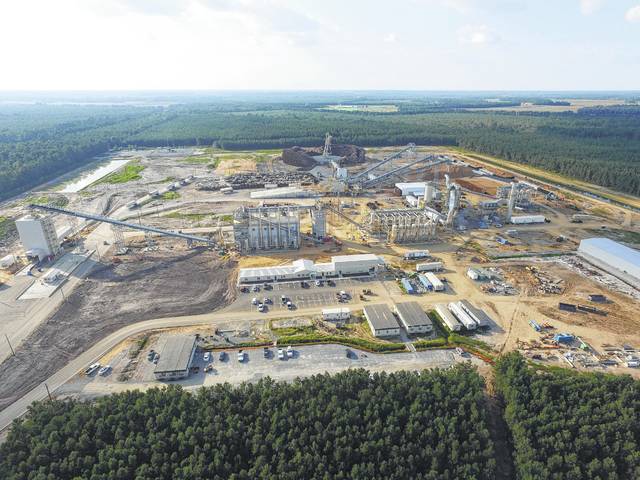Enviva has applied to increase production at its wood pellet plant in northern Sampson County, but it is not without opposition from a contingent of residents and environmental groups urging the state to deny the permit —and the governor to place a moratorium on the industry as a whole.
Enviva Pellets Sampson, a 500,000-metric ton wood pellet manufacturing facility, is located on a 200-acre site off Faison Highway. It is one of a handful of plants operated by Enviva, the world’s largest wood pellet manufacturer.
Those opposing the plant and its potential expansion maintain it is one of the top culprits in the devastation of the climate, while Enviva proponents cite its economic benefits and the company’s adherence to current air quality regulations and sustainable forestry measures.
A public hearing on the proposed expansion will take place at 6:30 p.m. at the Sampson Community College Activities Center, located at 1801 Sunset Ave., Clinton.
John Swope, executive director of the Sampson County Economic Development Commission, responded with a letter of support Thursday to the North Carolina Department of Environmental Quality (NCDEQ) in favor of Enviva’s request.
He said he plans to speak at Monday’s hearing as well.
“I am writing in support of Enviva’s permit to expand its Sampson County facility,: Swope stated in the letter. “It is our understanding this permit will enable Enviva to install additional air emissions control devises (sic) to ensure it is in compliance with all federal and state air quality standards. The new technology will allow Enviva to limit its emissions, be more flexible in its wood procurement procedures and boost annual production. All of these are positives for the region.”
Since its construction in 2016, Swope said, the facility has provided significant economic impacts to the region, including providing 90-plus direct and even more indirect jobs for local citizens, along with an initial taxable property investment of close to $130 million.
“As Enviva competes to meet the increasing global demand for renewable energy, the company continues to demonstrate its commitment to environmental stewardship and adherence to sustainable forestry,” Swope stated in his letter. “Through its community involvement, Enviva has also proven to be a good employer and neighbor.”
Enviva Pellets Sampson began production in October 2016. It was a long time coming, as a performance-based tax incentives package was approved for Enviva back in 2013.
The construction of an elevated water storage tank and the extension of water lines have been further assisted Enviva’s operations and set that interchange up for future development.
County leaders have cited Enviva as a success story for Sampson — and a blueprint it wants to repeat in its push for that development.
In 2017 and 2018, the first full years Enviva was in operation in Sampson, the company paid close to $1 million before grant-back incentives. County leaders said that directly, and positively, benefits taxpayers and their families.
The expansion of that industry would be a boon to the county, they said.
However, many residents across North Carolina have shared opposition to Enviva’s expansion via comments submitted on the website of environmental group Dogwood Alliance.
Enviva owns and operates seven plants in the southeastern United States that produce over 3 million metric tons of wood pellets annually. That includes four plants in North Carolina, a port facility in Wilmington and a headquarters office in Raleigh.
Pellets are exported primarily to power plants in the United Kingdom and Europe that previously were fueled by coal.
“Every year, Enviva devastates tens of thousands of acres of forests across the U.S. South and ships them overseas to be burned for dirty biomass energy — harming our forests, communities and our climate at every step of the process,” said Emily Zucchino, of Dogwood Alliance. “Enviva is undergoing plans for a major expansion across the South, and we must stand together to stop them.”
Locally, she said that includes Citizens for a Safe Environment, which includes residents of Sampson and Duplin County, who have spoken out about Enviva and other industrial ventures in the past.
“They have been opposed to this facility since before it was even constructed,” said Zucchino. “We expect approximately 30-40 people attending (Monday’s hearing) in opposition to the expansion of this industry.”
Scot Quaranda, communications director for Dogwood Alliance, said citizens, conservation groups and justice advocates are urging NCDEQ to deny the permit.
“They will also call on Governor Cooper to place a moratorium on the wood pellet industry and instead invest in forest protection and restoration, an equitable transition to 100 percent clean and renewable energy — such as wind and solar power — and an end to destructive industries coming into the state,” said Quaranda.
Wood pellet plants emit gases called volatile organic compounds, or VOCs, caused from burning fuel such as gasoline, wood, coal or natural gas. Those pollutants can cause cardiovascular and respiratory health problems, such as asthma, heart attacks and cancer, studies show.
Last month, Enviva announced a partnership with the Earthworm Foundation to enhance responsible sourcing and a collaboration with The Longleaf Alliance and other organizations to help restore longleaf pine forest ecosystems around its plants, beginning with a pilot project near Enviva’s new Hamlet plant in Richmond County.
That came in the wake of a settlement through which Enviva agreed to add more pollution controls to its under-construction Richmond County plant following a complaint filed in state administrative court by Clean Air Carolina against Enviva and NCDEQ.
A 20-inch-long cut-and-paste comment on the Dogwood website that people can sign their name to and submit — or modify as they wish — calls on Cooper to “demonstrate real climate leadership,” and place a moratorium on any expansion of the industrial-scale wood pellet industry.
It states in part, “Any expansion of carbon emitting projects — like the wood pellet industry — stands in direct contradiction with North Carolina’s commitment and responsibility to act on climate change.”
“We need standing, diverse, healthy forests to store carbon, protect us from flooding and storms, and provide us with clean air and water. Any expansion of this industry hampers North Carolina’s ability to meet its commitment on climate mitigation and adaptation, as well as communities’ ability to rebound and recover after storms like Hurricane Florence. Not only is the wood pellet industry endangering our forests and climate, but it is harming our communities.”
Christopher Brown, community relations manager for Enviva, urged supporters to submit comments in favor of the Sampson facility.
“Our opponents have used website engines to submit over 700 comments against our facility,” Brown stated via an email. Similar to Dogwood Alliance, Brown and Enviva offered easy cut-and-paste language, which mirrored Swope’s statement.
“We look forward to setting the record straight on Monday, July 15, 2019 at Sampson Community College,” Brown stated.


